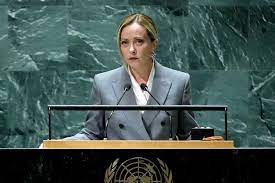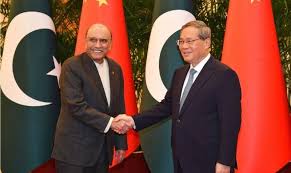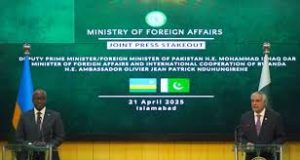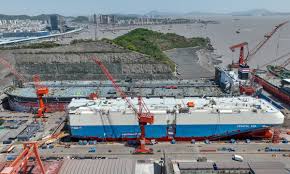Italy surprisingly stable under Meloni but fears remain

Chris Doyle
Rome: Up the road to the west of Lake Como, north of Milan, one rounds a corner and discovers a small plaque. A few tired flowers decorate it, but other than that it is easy to miss. It is the spot where, in April 1945, Italy’s fascist dictator Benito Mussolini was executed by firing squad.
Fascism has its roots in the Italian Peninsula; even the name has Latin origins. Mussolini was Europe’s first fascist dictator. His downfall was broadly welcomed but, unlike in Germany, there was no national reckoning as to what it all meant. There was no equivalent of the Nuremberg trials, no accountability for what had transpired. In the postwar years, erstwhile fascists reinvited themselves and remained part of the Italian political and economic scene. Italy has, therefore, never truly contended with its fascist past.
This is why it was such a shock when Giorgia Meloni and her Brothers of Italy party won the general election a year ago this week and she became prime minister. While denying that she herself is a fascist, many of her supporters certainly are. She promotes a vision of a Catholic Italy imbued with her deeply nationalist “patriotic” sense of what the country should be.

The electoral appeal of Brothers of Italy had not dipped by February, when it won key regional elections in Lombardy and Lazio, with Meloni’s block getting more than half the vote. She is not going anywhere soon.
Will this be a new and different era? It is certainly the most far-right government in Italy’s postwar history and the largest European state to be governed by the far right this century. Meloni is the first female prime minister in a country that was late by Western European standards in giving women the vote and equal rights. She has mastered the art of portraying herself as the underdog, the victim of a hostile mainstream media. She knows how to play the most effective populist tunes, following in the wake of others in European and American politics.
Was the campaigning Meloni genuinely different to Prime Minister Meloni? Was her campaign rhetoric all show. Has she softened? The answer is probably somewhere in the middle. Being in power compels a leader to be more realistic, more flexible, yet she clearly holds on to her deeply cherished beliefs, not least on immigration.
Like her fellow hard-right travelers in Europe, immigration is the great enemy, with illegal immigrants depicted as an existential threat to the nation. Meloni only last week proclaimed that she would not allow “Italy to become Europe’s refugee camp.”
However, Meloni may not have been as successful on this front as her rhetoric would indicate. The number of refugees and migrants arriving in Italy in the first half of this year was double that of the same period in 2022. She had to admit Italy has a shortage of skilled workers and that this is damaging the economy. In July, her government announced it would be issuing 425,000 work permits for non-EU migrants to fill a vast hole in the labor market. Consider what a climbdown this is given that, pre-COVID-19, Italy was only issuing 31,000 permits to non-EU migrant workers. In the long term, she wants this addressed by Italians having more babies — a view shared in Hungary by Viktor Orban.
Meloni’s hostility to the EU is blistering. In her campaign, she proclaimed that “playtime is over” for Brussels. This was amplified by her long-running feud with President Emmanuel Macron of France, but she has attempted to calm those tensions. She still rails about Brussels, blaming it for many ills, but has not blown apart the Italy-EU relationship.
Where Meloni has succeeded with the EU is in persuading it to sign various deals with North African states to restrict the flow of migrants and refugees into Southern Europe. Whether these will succeed and at what cost remains to be seen. Refugee groups are scathing about the detention centers in Libya and elsewhere. Meloni has had to appeal to the EU for help — perhaps marking a realization that bullying Brussels does not work when it comes to getting other EU states to take their share of refugees. She showered Rishi Sunak, the British prime minister, with praise for his immigration policy that includes a plan to deport asylum seekers to Rwanda.
The other fear is that Meloni would make common cause with fellow hard-right parties in the EU, such as those in Hungary, Poland and France. She has stood up to attempts to isolate Orban. But the knowledge that she has to win over many other EU leaders to achieve her ends appears to temper this. Much may depend on achieving a consensus in the bloc on how to handle immigration, which seems a distant prospect.
This could change in time, not least if European politics shifts further to the right. The European elections next June could be key. Possible ideological allies are gaining ground in Germany (Alternative for Germany) and France (National Rally). In 15 out of 27 EU states, a hard-right party scores above 20 percent in opinion polls, according to The Economist.
Meloni has also calmed matters with the US through her strong and consistent support on Ukraine and NATO. She has retained sanctions on Russia and committed to increased defense spending. Candidate Meloni did not sound as if she would and many feared she would head down the Matteo Salvini route of close ties with Russian President Vladimir Putin.
Yet the Meloni government has radical policies. It has developed a highly interventionist economic policy, which many might see as economic populism. It introduced a massive windfall tax on banks this summer, which it had to moderate. She wants to freeze the costs of expensive flights to Italian islands, upsetting airlines.
Speaking to Italians in Northern Italy, the economic powerhouse of the Italian state, many admit to coming to terms with her premiership. One businessman told me: “Many of us thought she would be a disaster, leading to a dreadful political climate and economic disaster. So far, this has not been the case. We shall see but, so far, it has not been as bad as we feared.” Another placed a great deal of the blame on the opposition, saying: “Meloni is in power because the opposition is so weak. She looks more competent than most of them.”
Italy’s turbulent politics will continue, albeit under Meloni it will be more stable than some have predicted. Many of Meloni’s backers and others, who she refers to as “I nostalgici” (the nostalgics), will still view the years of fascist rule as a legitimate and proud part of the nation’s early 20th-century history. Neofascism did not just reappear with Meloni, but has been rising inexorably for years. One just hopes that meager plaque near Como remains a backwater, not an inspiring shrine for a new generation of Mussolini fanatics.





